

What is a predicate? How does a predicate work? What is a compound, simple, and adjunct predicate? How are they different? These are all great questions about predicates. To get answers, continue reading this comprehensive English grammar guide.
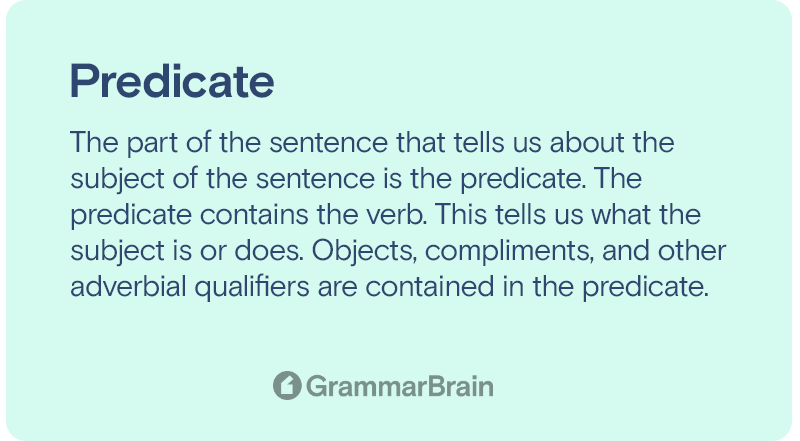
The part of the sentence that tells us about the subject of the sentence is the predicate. The predicate contains the verb. This tells us what the subject is or does. Objects, compliments, and other adverbial qualifiers are contained in the predicate.
If the predicate only contains a verb or verb phrase then it is a simple predicate. If other qualifiers are present, it is a complete predicate. The subject and the predicate together complete a meaningful sentence.
The predicate qualifies the subject. It gives us information about the person, place, or thing the sentence is referring to.
| Form | Definition |
| Predicate | The term predicate is used in one of two ways in linguistics and its subfields. The first defines a predicate as everything in a standard declarative sentence except the subject, and the other views it as just the main content verb or associated predicative expression of a clause. (Wikipedia) |
Every sentence is about a person, place, or thing. This is the subject. It can be a noun, a pronoun, or a nominal phrase. The rest of the information about this subject is contained in the predicate. In other words, everything in a sentence, except the subject, is the predicate.
The predicate has the verb, which tells us the action performed by the subject. It may or may not contain further descriptions of the subject or how it performs its action.
Let us understand the relationship between the subject and the predicate by looking at some examples.
In sentences where the predicate contains only the verb, we have one-word predicates.
In these sentences, the subject has no other qualifiers besides the action it performs.
Let us look at some examples of sentences with one-word predicates.
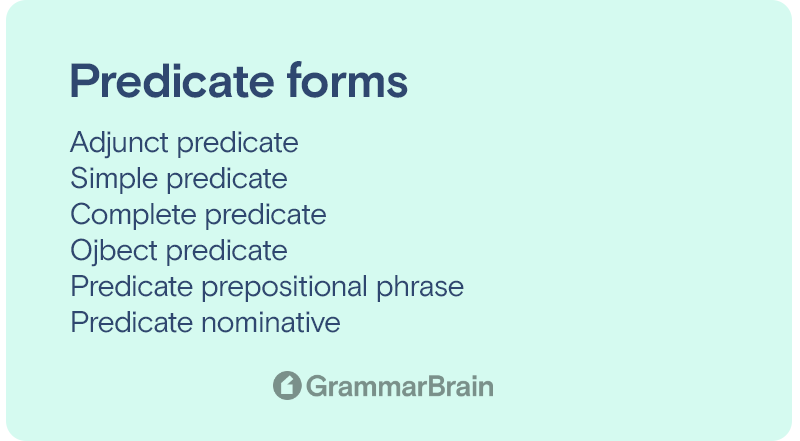
Predicate adjectives are adjectives that are connected to the subject by a linking verb. These adjectives describe the subject. They are called predicate adjectives as they appear in the predicate.
Predicate adjectives are different from normal attributive adjectives as they do not appear directly before the noun they qualify.
Predicate adjectives appear near the end of sentences or clauses. They appear after a linking verb. So if the predicate does not contain a linking verb, it cannot contain a predicate adjective.
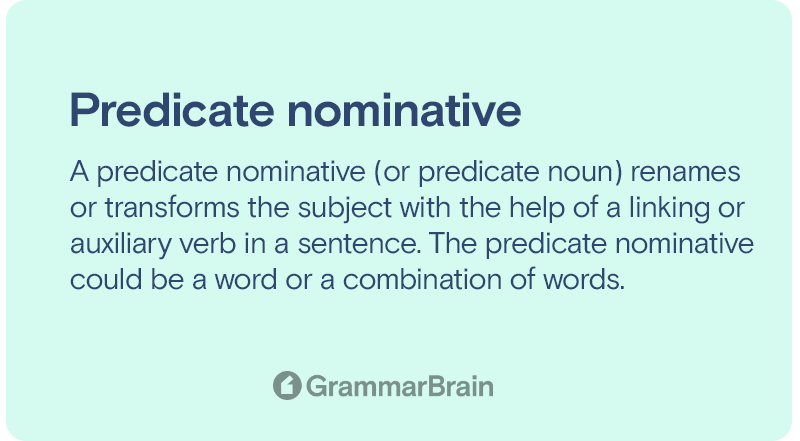
Predicate nouns or predicate nominative are nouns that appear in a predicate after a linking verb. Predicate nouns describe the state of being of the subject by qualifying its position or identity.
It can either be a noun or a noun phrase. It appears in the predicate. It follows a linking verb. It qualifies the subject. It describes the state of the subject. Predicate nouns cannot appear without a linking verb.
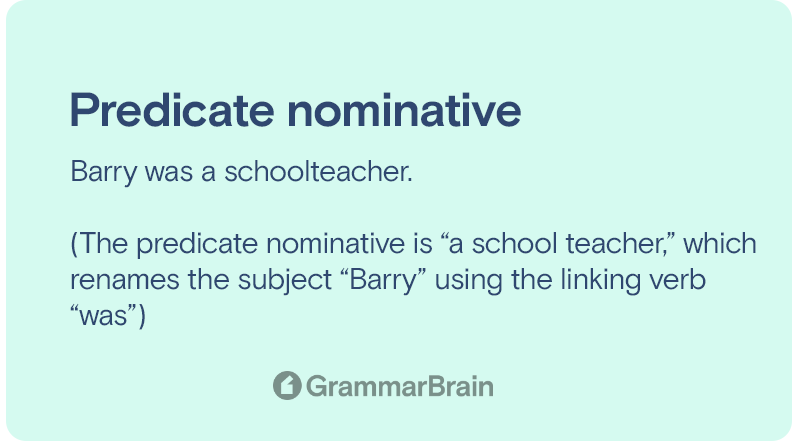
A predicate prepositional phrase is a prepositional phrase that appears in the predicate after a linking verb and qualifies the location of the subject. A prepositional phrase is a group of words that jointly act as a preposition.
It is a phrase that functions as a preposition. It appears in the predicate. It appears after a linking verb. It describes where the subject is located. It cannot occur without a linking verb.
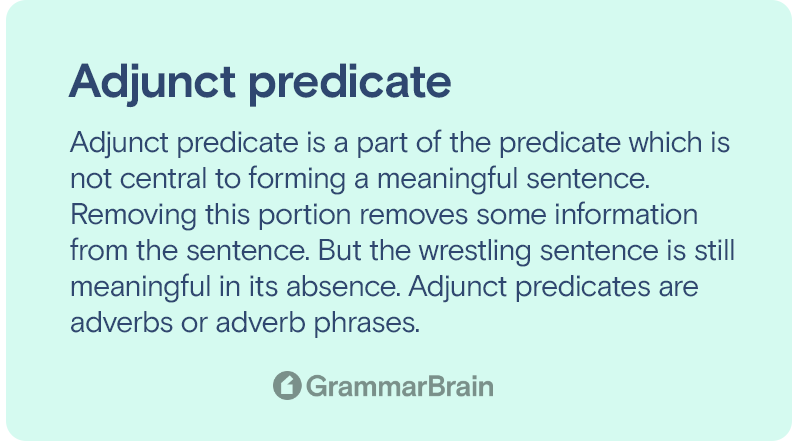
Adjunct predicate is a part of the predicate which is not central to forming a meaningful sentence. Removing this portion removes some information from the sentence. But the wrestling sentence is still meaningful in its absence. Adjunct predicates are adverbs or adverb phrases.
They are usually adverbs or adverbial clauses or phrases. They qualify the action performed by the subject. They are structurally dispensable. Although some grammarians argue that adjuncts are separate from the predicate, most agree that they are a part of the predicate.
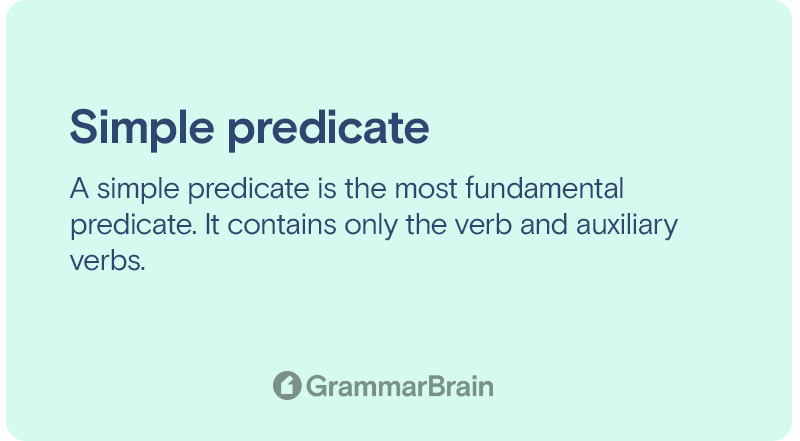
A simple predicate is the most fundamental predicate. It contains only the verb and auxiliary verbs.
Simple predicates only occur when the subject has no qualifiers. The sentence, in this case, is only the subject and the verb along with auxiliary verbs if they exist.
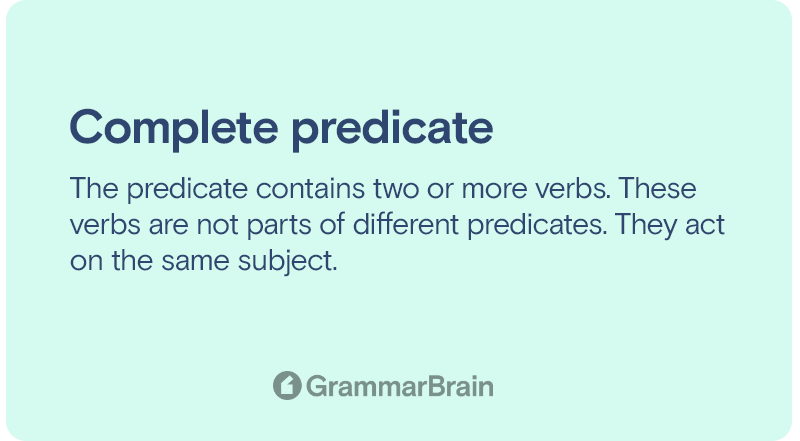
When the subject acts on two or more verbs contained in the predicate it is called a compound predicate.
The predicate contains two or more verbs. These verbs are not parts of different predicates. They act on the same subject.
A complete predicate is a predicate where the subject is followed by a verb and other qualifiers. All the words, except the subject and words and phrases describing it, that are contained in the predicate form the complete predicate.
It contains a predicate and other qualifiers. It does not contain modifiers that are directly related to the subject.
The object of a sentence is a part of the predicate which directly receives the action of the verb or indirectly receives the direct object. It can be a noun or a nominal phrase.
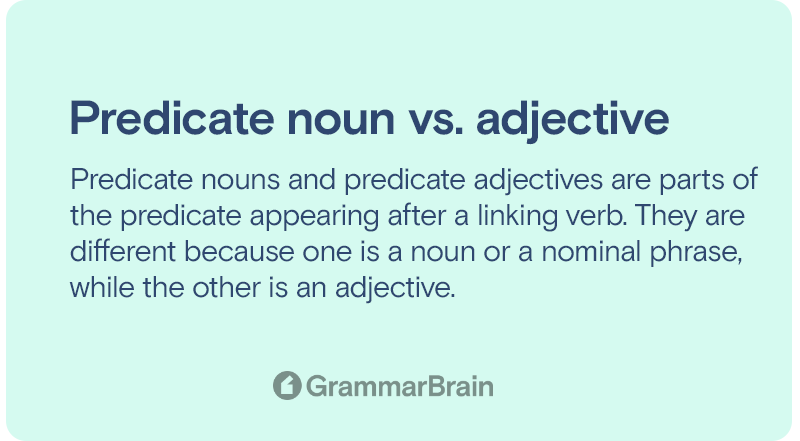
Predicate nouns and predicate adjectives are parts of the predicate appearing after a linking verb. They are different because one is a noun or a nominal phrase, while the other is an adjective.
A predicate adjective only appears in the predicate after a linking verb qualifying only the subject. An attributive adjective can appear in the subject or the predicate, qualifying either the subject or the object.
Yes, they are the same thing. Both are noun or noun phrases appearing after a linking verb in the predicate.
Are predicative adjectives and predicate adjectives the same thing?Yes, they are the same thing. Both are adjectives appearing after linking verbs in the predicate.
How do I find the predicate?All the words in the sentence except the subject and its modifiers are the predicate. The predicate will include the verb or verbs along with other modifiers.
What is predicate logic?The mathematical model used to reason with predicates which are functions that map variables to truth values known as predicate logic.
What are compound predicates?Clauses contain at least one subject and predicate but this isn’t necessarily a complete sentence.
How do predicates and clauses work together?Clauses contain at least one subject and predicate but this isn’t necessarily a complete sentence.
Inside this article

Fact checked:
Content is rigorously reviewed by a team of qualified and experienced fact checkers. Fact checkers review articles for factual accuracy, relevance, and timeliness. Learn more.

About the author
Dalia Y.: Dalia is an English Major and linguistics expert with an additional degree in Psychology. Dalia has featured articles on Forbes, Inc, Fast Company, Grammarly, and many more. She covers English, ESL, and all things grammar on GrammarBrain.